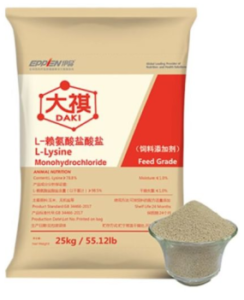What are the types of amino acids
Amino acid is the basic unit of protein. It is an organic acid containing amino group. It is composed of carbon, hydrogen, oxygen and other elements. The protein in the feed cannot be directly used by animals, but is decomposed into peptone and peptides by the combined action of digestive enzymes such as pepsin and trypsin, and cannot be used by the organism until the simplest amino acid. Therefore, protein nutrition is actually amino acid nutrition.
The types of amino acids
Amino acids are the basic unit of protein, there are about 200 kinds, but they play an important role in animal nutrition and there are only 20 kinds widely known, which are called standard amino acids. According to the nutritional requirements of animals for amino acids, they are generally divided into two categories: essential amino acids and non-essential amino acids. Essential amino acids refer to the standard amino acids, which cannot be synthesized by the animal itself, or the rate or amount of synthesis cannot meet the normal growth needs of animals. A class of amino acids provided by feed. Non-essential amino acids are not necessary or necessary amino acids, but are a class of amino acids that the animal can synthesize itself or require less. The most restrictive amino acid that needs to be supplemented in the feed is called the first restricted amino acid, and the latter is called the second restricted amino acid.
Effects of amino acid feeds on different animals

- Laying hens and dairy cows can be prolonged for 1-2 months, and pigs can be slaughtered 10 days in advance.
- It has the aroma and umami of hydrolyzed protein, and has good palatability (this product is divided into brown, yellow, brown and yellow colors).
- Improve fertility rate, hatching rate, litter rate, and survival rate.
- Significantly reduce the feather and anus pecking of laying hens.
- It can prevent or alleviate chicken diarrhea, the egg color is beautiful, the egg weight is increased, the pig hair is bright, and it is sleepy and unwilling to move.
1. Save protein and improve feed utilization efficiency Generally, in plant feeds based on cereals and soybean meal, lysine and methionine cannot meet the needs of animals. For example, the addition of amino acids can greatly save protein, reduce feeding costs, and improve animal production. effectiveness. Tests have shown that adding 0.1% lysine to a diet containing 12% crude protein in growing pigs has the same effect as feeding 16% crude protein. Another example is to add an appropriate amount of lysine to a diet containing 14% of crude protein in laying hens, and its egg production rate is equivalent to that of a diet containing 17% of crude protein.
2. The addition of synthetic amino acids can improve the quality of livestock and poultry meat. The addition of lysine to the diet of pigs and broilers can improve the quality of meat and increase the lean meat rate. Experimental studies have shown that adding lysine to animal diets can balance lysine, increase the efficiency of protein synthesis in the animal body, relatively reduce the fat content of the animal body, increase the proportion of lean meat, and improve meat quality.
3. Adding amino acids can improve animal digestive function and reduce environmental pollution. When the crude protein content of intensive feeding piglets and growing chickens is high, digestive diseases such as diarrhea are prone to occur, which not only causes feed waste but also affects animal growth. Adopting methods such as reducing the protein level of animal diets, adding additional methionine, lysine, and glutamic acid can effectively improve the digestive function of animals, reduce diseases, and enhance animal resistance.
4. The addition of amino acids to reduce animal stress is due to changes in external environmental conditions or other factors that cause animals to experience a physiological maladaptive phenomenon, which will cause a sharp decline in feed intake, affecting growth and yield and quality of livestock products. Adding certain amino acids can reduce the occurrence of stress. Tests have shown that the addition of tryptophan can prevent pigs from being stressed due to weaning and excessive feeding density; the addition of methionine can reduce the feather-pecking and anus-pecking of poultry; the addition of glycine can eliminate certain excessive amino acids and Generated stress.


 +372 6444012
+372 6444012 info@agravial.eu
info@agravial.eu 